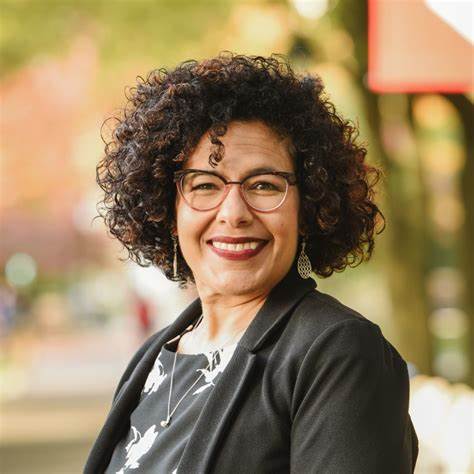The Africana Studies & Latin American and Caribbean Studies Programs closed out their Black History Month programming on Feb. 28 with a talk by Brooke Vick, Ph.D., entitled “Dismantling Imposter Syndrome(s)/Phenomena: A Solution-Oriented Discussion.” This year’s Black History Month programming was themed, “A Love Letter to Black Mental Health and Wellness Initiatives,” a series organized by Emanuela Kucik, Ph.D. and Elena FitzPatrick Sifford, Ph.D., dedicated to identifying and talking about issues that greatly affect the mental health of Black students and other students of color. This particular talk was in conjunction with the Graduate School Preparatory Program (GSPP), and was particularly focused on imposter syndrome and its effect on students pursuing graduate school.
The talk was hosted by Kucik and Sifford, as well as Giancarlo Cuadra, Ph.D., of the GSPP. Kucik and Sifford introduced Vick, the primary speaker. Vick is currently the inaugural vice president for diversity, equity and inclusion at Swarthmore College. She was previously appointed as the first chief diversity officer and associate provost for equity and inclusion at Muhlenberg College, while also being a professor of psychology.
The first question posed to Vick asked for a definition, as well as a description, of how one may be affected by imposter syndrome or imposter phenomena. Vick defined imposter syndrome as persistent self-doubt in one’s skills and abilities, feelings of not having earned what one has achieved and a general fear of being exposed as a fraud. Imposter syndrome is also closely connected to experiences of anxiety and depression and a hesitance to take risks. While often experienced by people who have achieved great things, Vick describes imposter syndrome as disproportionately affecting people of color, because “the higher we get, the less represented we become.”
While the more common term in our society is “imposter syndrome,” Vick argues that “imposter phenomena” is more accurate. She argues that “syndrome” pathologizes the experiences of many, and indicates a diagnosable problem within an individual, rather than attitudes perpetuated by the broader culture to which one is exposed.
While Vick provided an in-depth overview of what imposter phenomena is, audience questions delved deeper into how individuals, especially students of color pursuing higher education, are affected.
The prevalence of imposter phenomena in underrepresented communities, especially for people of color, is typically context-specific. Vick described how the presence of racism, misogyny, homophobia and other prejudiced attitudes are often internalized and exacerbated by the environment one is in. Harkening back to her earlier point, Vick pointed out that when someone does not see themselves represented in an area, they ask themselves questions like “Do I belong here? Do people like me succeed here?” Because the answer tends to be no, Vick explains, the experiences of imposter phenomena are amplified.
Following the talk, Jason Rackas ‘26, stated, “Dr. Vick provided an interesting perspective, especially in discussing how a lack of diversity and representation in professional spaces and imposter phenomenon can create a vicious cycle.” He continued, explaining, “Ultimately, the event was a great opportunity to gain an understanding of the profound impacts of DEIB (Diversity, Equity, Inclusion and Belonging) practices in post-graduate academic spaces and beyond.”
Rackas’ comments align with what many students and faculty members had to say about a version of this event that Vick did last year for the GSPP. This feedback, as well as this year’s Black History Month theme of mental well-being, provided the opportunity for Vick to come back and give another talk.
Kucik explained that recurring worries she and Cuadra frequently heard from students as co-directors of the GSPP inspired the event. “[Students] fear they are not as qualified or competent as their classmates, and this fear can be worse for students from underrepresented backgrounds because institutions are often set up in ways that reinforce age-old systems of inequity and power. When it comes to graduate school and post-college jobs, many students have mentioned that they worry about this feeling of inadequacy continuing, or even worsening, after they graduate from college.”
Kucik stated that “We want students to know that they are more than capable and qualified, and any graduate school or job would be immensely fortunate to have them.”






















